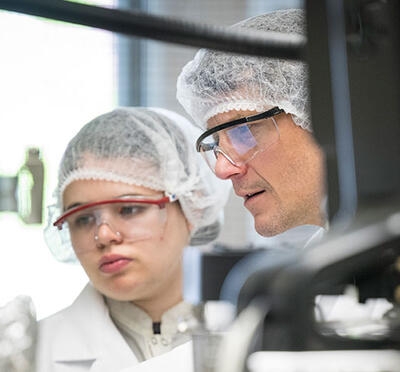Naomi Fitter, Oregon State University associate professor of robotics, is passionate about creating robotic systems that fulfill people’s needs.
The National Science Foundation is backing Fitter’s work with a Faculty Early Career Development Award. The five-year award, totaling $687,156, will support research to design and study robotic nudging systems that promote the health of older adults. This effort is part of Fitter's broader research program, which centers on robot nudging to promote wellness practices.
"Assistive robotics for older adult care is popular right now because of anticipated shortages in the health care system,” Fitter said. "I like the idea of being able to free up caregivers’ time for more socially beneficial interactions by reducing time spent on mundane tasks that robots can help with.”
What is robot nudging?
A “nudge” can be any intervention designed to influence human behavior, like using speed bumps to encourage slower driving or fitness trackers to promote exercise.
“Robot nudging is using robots to gently prod people toward a desired behavior, ideally in a way that aligns with their goals or motivations,” Fitter said.
Fitter’s CAREER Award project focuses on robots that support hydration in older adults who are living independently or in a skilled nursing facility. Studying the effectiveness of different nudging techniques will help Fitter design a successful robot.
“If, for example, a buddy brings you a bottle of water, you might be more likely to drink it than if you get a reminder on your phone,” Fitter said.
Fitter says there are not a lot of instances of nudging being used in robotic systems. For the hydration robot project, she will integrate behavioral nudging strategies with principles of human-centered design, incorporating insights from performance artists.
Human-centered design
Fitter has been spending a lot of time over the past few years at the Oregon Veterans’ Home in Lebanon learning about the needs of residents and their caregivers.
As part of the AI-CARING Institute, a multiuniversity, NSF-funded effort based at Oregon State, Fitter has been leading research to promote exercise and social interaction in older adults. Central to that effort have been hours of observations and interviews at the facility.
“Water delivery, help with picking up items, and finding lost items were some of the top reasons residents called for help,” Fitter said. “Hydration seemed like a salient problem where robots could make access to water easier and share reminders to drink.”
Leveraging collaborations
Fitter says part of what makes this project possible is the relationships she has established in the last few years with the Oregon Veterans’ Home residents and staff and her collaborators, Carolyn Aldwin, a professor emerita who studies healthy aging, and Christopher Sanchez, associate professor of psychology who specializes in the intersection of humans and technology.
“Robotic nudging is a challenging problem and one where these partnerships will be very helpful," Fitter said.
In addition to her usual collaborators, Fitter will work with performance artists like street performers, clowns, stand-up comedians, and improvisers. During the design process, their creative thinking will inspire the robot’s behavior, its form, and how it’s tested.
“Performance artists know a lot about being attuned to human behavior, reading the room, and how to get people to engage, even when they're a little nervous or don’t know what to expect,” Fitter said.
Fitter plans to test prototypes in homes where older adults live independently or with care partners, as well as at skilled nursing facilities or other community-living settings. The final evaluation will look at which setting provides the best fit for the technology.
“What I appreciate about Naomi is the rigor with which she approaches questions in social robotics,” Sanchez said. “Doing good methodological studies of these interactions allows us to say with a strong degree of confidence how we're impacting human-robot interaction.”
The undergraduate and graduate student members of Fitter's SHARE Lab are key collaborators in developing and testing the robots.
“It's really nice when you can build up resources, student expertise, and connections, and then capitalize on those links to further develop the research technology,” Fitter said.




